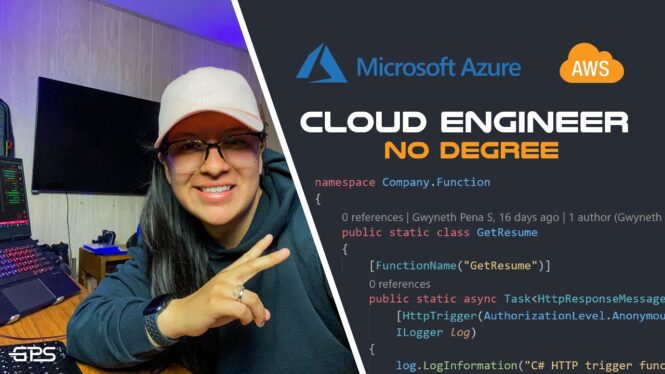The world of technology is ever-evolving, and one of the most promising career paths today is cloud engineering. Cloud engineers play a vital role in the digital transformation of businesses, helping them harness the power of cloud computing.
If you’re considering this career but don’t have a four-year degree or have education in another field, you might be wondering: Do I need a degree to become a cloud engineer?
Here’s the quick answer: Not necessarily.
In this article, we’ll explore the various paths to becoming a cloud engineer, from non-degree alternatives to the traditional degree route.
The Rise of Non-Degree Paths
The IT industry is undergoing a significant shift towards skills-based hiring. Employers are increasingly valuing practical skills and certifications over formal degrees. According to one LinkedIn report, 86% of hiring managers prioritize certifications when evaluating candidates. This shift is good news for aspiring cloud engineers without a degree.
Alternative paths such as IT certifications, bootcamps, and online courses are gaining traction. These routes offer several advantages, including cost-effectiveness, shorter timeframes, and dedicated career services support. QuickStart, for instance, provides comprehensive cloud engineering training that prepares you for the workforce efficiently and effectively.
Exploring the Traditional Degree Path
The conventional route to becoming a cloud engineer often involves pursuing a computer science or related degree. While a degree can provide a strong foundation, it may not be the quickest or most cost-effective option. It typically takes four years to earn a degree, and the tuition costs can be substantial.
By the time you graduate, the skills you develop might also be outdated. Changes in cloud computing best practices, alongside new developments in technology, might mean that the cloud skills you developed in college might need an immediate update.
On the flip side, having a degree can open doors to broader career opportunities and potentially higher initial salaries. However, it’s essential to weigh these advantages against the investment in time and money.
Importance of Cloud Certifications
Cloud certifications, such as those offered by AWS, Azure, and Google Cloud, play a pivotal role in the cloud engineering field. These certifications validate your skills and knowledge, making you more attractive to employers. QuickStart, for instance, specializes in Microsoft Azure training, which is highly relevant in today’s workplace.
Statistics show that certified cloud professionals can earn up to 15-20% more than their non-certified counterparts. This demonstrates the tangible benefits of pursuing certifications, even if you don’t have a degree.
Skill Sets Required
To excel as a cloud engineer, you’ll need a diverse set of skills. Technical competencies like infrastructure as code, cloud security, and automation are crucial. Additionally, soft skills such as problem-solving and communication are equally important, as cloud engineers often collaborate with diverse teams and stakeholders.
Here are a few more skills you might need to become a cloud engineer:
- Cloud service proficiency: In-depth knowledge of the major cloud providers (e.g., AWS, Azure, Google Cloud) and their respective services is essential. You should be able to choose the right services for specific tasks and understand their pricing models.
- Networking fundamentals: Understanding network protocols, routing, and load balancing is crucial for designing and managing scalable and secure cloud environments.
- Containers and orchestration: Proficiency in containerization technologies like Docker and container orchestration tools like Kubernetes is valuable for deploying and managing applications efficiently.
- Monitoring and logging: Familiarity with monitoring and logging solutions (e.g., Prometheus, Grafana, ELK stack) helps in tracking system performance, identifying issues, and optimizing resources.
- DevOps practices: Knowledge of CI/CD pipelines and tools like Jenkins, Travis CI, or GitLab CI is essential for automating software deployment and updates.
- Scripting and coding: Proficiency in scripting languages such as Python, Ruby, or Bash is valuable for automating tasks and infrastructure management.
- Cloud security: Understanding IAM policies and best practices for securing cloud resources is vital for maintaining a robust security posture.
QuickStart’s comprehensive training programs not only cover technical aspects but also help you develop essential soft skills like communication, problem-solving, teamwork, and adaptability to thrive in your cloud engineering career.
Earning Potential and Career Growth
One of the primary concerns for anyone considering a career is earning potential and career growth. With that being said, the cloud engineering field offers promising prospects for those looking to grow in their professional life.
According to a recent survey from ZIpRecruiter, the average salary for cloud engineers in the United States is upwards of $130,000 per year. Moreover, the job market for all computer and information research scientists, of which cloud engineering is a subset, should grow 23% through 2032 (U.S. Bureau of Labor Statistics.) That’s a growth rate much faster than the average for occupations.
Balancing Education and Certification
Finding the right balance between formal education and certifications is key. If you’re considering a degree while pursuing cloud certifications, QuickStart’s Cloud Engineering Bootcamp offers flexible options to help you achieve both goals due to its accommodating schedule to work around learner’s lifestyles.
Do I need a degree to become a cloud engineer?
In the quest to become a cloud engineer, the question of whether or not you need a degree is just one piece of the puzzle. Ultimately, your decision should align with your career goals, resources, and personal circumstances. It’s important to emphasize that quality training and continuous learning are crucial, regardless of your chosen path.
We invite you to explore QuickStart’s IT training offerings, including our cloud certification courses, such as Microsoft Azure, to embark on your journey towards a successful cloud engineering career. No matter your choice, making an informed decision sets you on the path to success in this dynamic and promising field.
https://www.quickstart.com/cloud-computing/degree-cloud-engineer/

